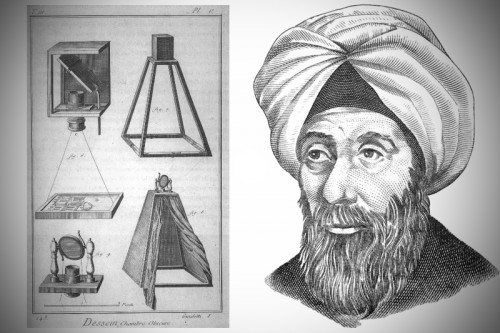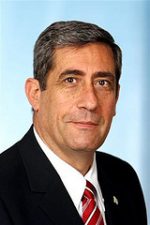At the MENASOL conference in Cairo last week, MENA Cleantech’s Samer Zureikat cited this 11th century scientist, Ibn al-Haytham, as one of the forefathers of solar technology. (Image via orientpix.com)
I was sitting behind Samer Zureikat, the CEO of MENA Cleantech, at the MENASOL solar energy conference in Cairo last week when one of the speakers declared that CSP (concentrating solar power) is not economically competitive for large-scale generation of electricity. It was clear that Zureikat disagreed: He shook his head from side to side in disbelief and began chuckling.
Later he would admit that he is indeed “obsessed” with CSP, and explained that he prefers to use the active form “concentrating” instead of the passive “concentrated” – “because that’s what you’re actually doing.”
Zureikat, a Jordanian, is a young man with extensive international experience. He acquired his unaccented English at American schools during a childhood that included stays in Lebanon, Greece and Egypt. He returned to Jordan after completing a degree in marketing at the Wharton School of Business in Philadelphia and started a chemical factory, which he managed for about 11 years. Then, ready for a change in venue, he relocated to Germany, where he started a clean tech fund.
After gaining some expertise in the clean tech world, Zureikat decided to focus on developing energy and water projects in the Middle East and North Africa, and founded MENA Cleantech to pursue this goal. The company is now engaged in its initial project – JOAN1, a 100 MW solar power plant in Ma’an, Jordan (using CSP technology, of course). Zureikat hopes to have the contracts in place for this project by the end of the year and to commission the plant in 2013.
Green Prophet: How big a company is MENA Cleantech?
Zureikat: “We’re a very small company. We are basically a partnership of Jordanians with some support staff, and we outsource most of the work (engineering, financial advisory, legal).”
Green Prophet: What other markets are you targeting besides Jordan?
Zureikat: “We’re taking one step at a time. JOAN1 is first, and then we’ll dedicate ourselves to the other markets. The horizon in the MENA region, besides Morocco, is very bespoke. Jordan makes it very easy to do business on an IPP – independent power producer – model.”
Green Prophet: JOAN1 is one of three major projects planned for the Ma’an region of Jordan?
Zureikat: “I’m aware of Shams Ma’an, which is a Kawar Energy project. I’m also aware that Millennium Energy Industries is doing a feasibility study on a CSP plant. There could also be other projects being developed and I hope there are. Ma’an has an abundant supply of land that is ideal for solar power and the government has said that it would like to develop around 600 MW of solar and I believe that this figure will go up once projects are actually on line – provided that we can do it cost effectively. And I think that’s the name of the game.”
Green Prophet: And what about the claim that CSP is not cost effective – especially in comparison to PV [photo-voltaic] technology?
Zureikat: “People are obsessed with the collapse of PV module prices and I think this is why they start to compare CSP prices with PV. From my perspective, I see PV as an energy-efficiency tool as opposed to a power-generation tool. CSP is producing energy based on age-old technology and it’s designed to be utility scale. We’re not taking something that was designed to be on rooftops or calculators and then pretending that this is going to be the future of power generation. PV is the future of building-integrated energy efficiency, and I would agree with that wholeheartedly and I would be the first to put those tiles on my roof that have PV technology integrated into them. But I wouldn’t say, ‘Let’s take this open field and put up PV modules on it for a power plant.’”
Green Prophet: In your presentation at MENASOL, you also stressed the connection between the energy and water problems in the region.
Zureikat: “The basic thesis is that we don’t have water today and we’re not going to have any more in the future, but we are going to have more people in the future. And what is already a very energy-intensive water use cycle in MENA will become more energy-intensive in the future. It is important to note that not just desalination of the water, but also the transmission of water is very energy-intensive, as is water treatment.
“What we need is to decouple the water use cycle in North Africa and the Middle East from fossil fuels. So, getting concentrating solar power integrated into the generation mix in these countries will at least give us the comfort that, whatever happens, we will always be able to rely on solar resources in order to power our water use cycle. And we need to invest in this now.
“Unlike Spain, for example, we are not just aiming to reduce our carbon footprint. We have a much more existential need to introduce CSP into our energy mix, not just for reducing our CO2 emissions. It is much more existential for us and we need to realize that.”
Read more on solar energy in Jordan:
Ausra Reflectors to Power 100 MW Solar Thermal Plant in Jordan
Kawar and Italian Solar Energy Plan ‘Shams Ma’an’ for South Jordan
Jordanian Activists Pioneer and Test Thin Film Solutions for Greenhouses




It would be great if you or another writer would run a series of features on these little known pioneers.
I added a link in the caption to a biography of him. Samer also mentioned a couple other Muslim pioneers in this field including the 10th century scientist Ibn Sahl,and he also noted that an early CSP facility was operating in Cairo in 1913!
Cool interview. I’d love to learn more about Ibn al-Haytham…